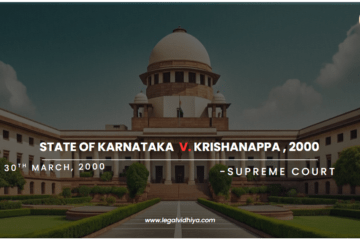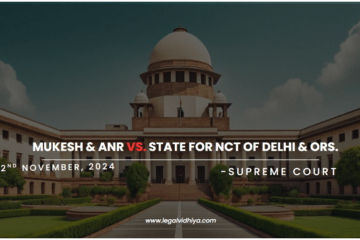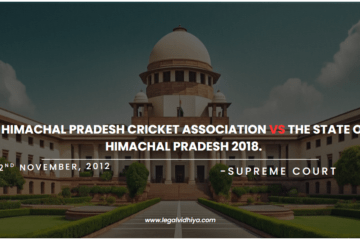
INTRODUCTION
In a recent case of Infrastructure Leasing and Financial Services Ltd. v HDFC Bank Ltd. & Anr., the Supreme Court, clarified the legal stance on the transfer of actionable claims. This ruling emerged from a dispute between Infrastructure Leasing and Financial Services Ltd. (IL&FS) and HDFC Bank Ltd.
In an appeal preferred by Infrastructure Leasing and Financial Services Ltd. (‘IL&FS’/ borrower) against the order of the National Company Law Appellate Tribunal (‘NCLAT’), the division bench of S. Ravindra Bhat* and Dipankar Datta, JJ. while upholding the impugned order, has held that the rents receivable by a borrower can be assigned to a lender as an “actionable claim” as per the Transfer of Property Act, 1882.
What is IL&FS?
Infrastructure Leasing & Financial Services Limited (IL&FS) is a systemically important Core Investment Company with the Reserve Bank of India and is engaged in the business of giving loans and advances to its group companies (and holding an investment in such companies). IL&FS has a large number of group companies across various sectors such as Energy, Transportation, Financial Services etc. IL&FS was initially promoted by the Central Bank of India, HDFC Limited and the Unit Trust of India.
BACKGROUND
IL&FS had approached HDFC for financial assistance. By sanction letter a financial facility of Rs. 400 crores was sanctioned to the borrower. On 25-06-2018, a Master Facility Agreement (“MFA”) was entered between IL&FS and HDFC for Rs. 400 crores. The MFA envisioned the creation of a separate escrow account with Housing Development Finance Corporation Bank Limited ( ‘Escrow Bank’) for opening of a separate escrow account with the Escrow Bank. Along with MFA, an Assignment Agreement (‘Agreement’) was also executed between the IL&FS and HDFC. By the impugned order, NCLAT held that so far as part of the receivables deposited in the Escrow Account which were sufficient to meet the principal and interest assigned by IL&FS to HDFC, no proprietary interest continued with IL&FS, nor could it exercise any right over that part of the Escrow Account which was assigned. It was also held that the freeze order of 15-10-2018 neither negate the Agreement nor did it take away the property right of HDFC in the lease rental receivables. However, the right over receivables deposited in the Escrow Account to the extent they were in excess of principal and interest, was retained by the IL&FS and in the event, any amount in excess of the said principal and interest was transferred to or debited in the HDFC’s account and they needed to be reversed, after adjusting the shortfall in debiting any interest or principal of any earlier months.
ISSUE
Whether the documents executed by IL&FS by which rents were made over to HDFC constituted an assignment and thus fell outside the scope of an asset and security freeze order made by the NCLAT?
Supreme Court’s Final Verdict
The Supreme Court’s verdict upheld the assignment of rents as a transfer of actionable claims, which fell within the purview of the TPA. The Court also emphasized the nature of such assignments as Lease Rental Discounting agreements. Ultimately, the Court’s decision reaffirmed the transferability of debts and actionable claims under the TPA, providing legal clarity in this context.
In light of the Court’s comprehensive analysis and clear judgment, this decision sets an important precedent for similar cases and contributes to the legal understanding of actionable claims and the Transfer of Property Act.
Relevant Sections of the Transfer of Property Act
– Section 3: Defines “actionable claim” as including a claim to an unsecured debt and a beneficial interest in movable property.
– Section 130: Outlines the manner in which actionable claims can be transferred.
This landmark judgment offers legal clarity on the assignment of actionable claims and will serve as an essential reference for future cases involving the Transfer of Property Act.
ANALYSIS
The Court noted that a Power of Attorney was executed by IL& FS on 25-06-2018. By the Power of Attorney, the borrower irrevocably nominated, constituted and appointed HDFC as its true and lawful attorney on its behalf. By recital clause 2 of the said Power of Attorney document, HDFC could “appropriate the proceeds received towards the discharge of the facility”; recital clause 5 enabled the lender to put to use, the secured property and give the business centre, etc, on leave, license or lease basis in the event the borrower’s existing arrangements were terminated or ended. Recital clause 7 enabled HDFC to receive all rents and all other sums in respect of such premises. Further, it reiterated a principle of contract interpretation, that the substance of a document is discernible from its terms, rather than the label or its nomenclature. That one document is styled or described in a certain manner, or that it uses a certain expression, or term is not conclusive; it is the effect of all the terms, of the documents, which bring out the true purport and intention of the parties. Likewise, another allied principle of contract interpretation, is that where the transaction is not the subject of one document, but several, which refer to each other, or a reading of all, describe the entire contract, then, it is open to the court to consider all of them together. The Court said that the condition in the assignment and administration agreement clearly indicates that rents payable to IL&FS stood unconditionally assigned to HDFC. The use of the expression “pledge” in this context cannot be made much of, as the assignment is not hedged with any condition; it entitles HDFC to appropriate the proceeds, to the extent of liability of IL&FS. The Court further said that the future rent payable is actually an unsecured debt that the owner/borrower would have been otherwise entitled to claim, but for the assignment or transfer, to the lender/creditor. Because the owner is a debtor of the bank, the latter becomes the creditor of the tenant or the lessee as the case may be. This arrangement has the advantage of virtually ring fencing the creditor from the eventuality of bankruptcy or an insolvency event, which the borrower might be exposed to. The Reserve Bank of India (‘RBI’) has formulated guidelines which regulate all banks’ conduct regarding the Lease Rental Discounting (‘LRD’) facilities, and they extend to a class of borrowers who own commercial properties. The Bench noted that clauses 1 and 4(c) and (j) of the Assignment Agreement categorically set aside the rents payable to IL&FS, in favour of the assignee (lender bank). Furthermore, the Escrow Agreement records that all receivables to which the borrower would be entitled would be deposited in the escrow account. Furthermore, the lessees or tenants of the properties owned by the borrower be instructed to pay such an amount in the escrow account itself. Further, it noted that Clause 4(c) of the Escrow Agreement authorizes only HDFC to instruct the escrow bank to transfer the amounts and permits the bank to appropriate amounts towards adjustment arising out of the Facility liability. In the same line, the Power of Attorney document categorically entitles the HDFC to appropriate the proceeds deposited towards the discharge of the borrower’s liability under the Facility. Clause 5 similarly entitles access to the lease rent. Furthermore, the Bench said that the lender virtually steps into the shoes of the borrower and by the terms of the Power of Attorney is also authorized to let out the premises, in case of an unforeseen situation wherein an existing lessee or tenant vacates it or is unable to pay. Thus, after applying the rule that all the contemporaneous documents are to be read together, to discern the true purport of the contract, the Court said that the parties intended assignment of the debt, i.e., the rents payable. After taking note of the definition of “Actionable claim” defined by the Transfer of Property Act, 1882, the Court held that the said arrangement is an assignment and not a pledge. The reference to pledge, in some places in the documents, did not undermine the fact that the rents payable to and receivable by IL&FS stood absolutely assigned to HDFC. Thus, there can be a transfer of debts, which are defined as actionable claims. In the present case, the rents payable by IL&FS tenants, lessees and licensees are debts, which stood transferred to the creditor, i.e. HDFC Bank. Therefore, the Court held that NCLAT’s conclusions are unexceptionable; the challenge to its correctness, therefore fails.
RULING AND RATIONALE
The Supreme Court examined the legal nature of Lease Rental Discounting (LRD) agreements and observed that IL&FS’s documents, although not explicitly termed “LRD,” functioned as such. The true intent of the parties was to assign the debt, i.e., the rents payable.
The Court relied on Section 3 of the Transfer of Property Act, 1882, which defines actionable claims as claims to unsecured debts and beneficial interest in movable property, both enforceable. Section 130 of the Act outlines the manner in which actionable claims can be transferred.
The Court concluded that the rents payable by IL&FS tenants, lessees, and licensees constituted debts and had been transferred unconditionally to HDFC Bank. The NCLAT’s order was upheld, confirming that the documents executed by IL&FS constituted an assignment and were not subject to the asset freeze order.
CONCLUSION
This ruling sets a significant precedent in the legal landscape, affirming the transferability of actionable claims and highlighting the importance of understanding the true substance of a transaction. It underscores the significance of precise legal documentation in financial agreements.
Written by Shristi an intern under legal vidhiya.
Disclaimer: The materials provided herein are intended solely for informational purposes. Accessing or using the site or the materials does not establish an attorney-client relationship. The information presented on this site is not to be construed as legal or professional advice, and it should not be relied upon for such purposes or used as a substitute for advice from a licensed attorney in your state. Additionally, the viewpoint presented by the author is of a personal nature.




0 Comments